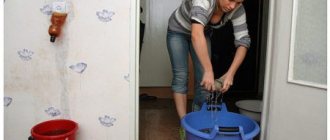Actions and rights in case of apartment flooding
Once a leak is detected, you must:
- take measures to ensure safety (turn off the electrics, make sure hot or cold water breaks through before choosing a method to stop it);
- stop the leak (turn off the water, remove water from the floor, call emergency services);
- inspect the damaged premises (damage recording);
- resolve the issue of compensation for damage (“neighborly”, with the involvement of a lawyer, through the court).
If it’s your fault, you need to compensate for the damage to the neighbors below , having previously identified and recorded the damage caused. We described in detail how to assess the consequences of flooding here.
If you are not at fault or do not agree with the invoice, then several scenarios are possible:
- negotiation;
- expertise;
- claim (if the flood occurred due to the fault of the management company or the store sold a low-quality product, which was the reason);
- court.
How is damage compensated?
IF in the end you were to blame for flooding your neighbors below, the question “what to do” receives a clear answer - to compensate for the damage caused. The simplest method is to agree with the victims on how and in what order you will solve the problem. For example, buy them wallpaper, finishing materials, physically help them carry out repairs, etc. However, such an agreement is possible only if the situation is resolved peacefully.
In a situation of conflict and resolution of the situation through the court, the injured party confirms its claims with an act of flooding, an assessment report by a professional appraiser, photos and video materials. And then the court will determine the amount of financial payments due. For the culprit, such a development of events is unprofitable, since he may be additionally charged compensation for moral damages and legal costs.
What to do first?
When a spill occurs, you need to:
- Turn off the electrics. Moving towards the source of the flood (faucet or pipe, washing machine or dishwasher, flow-through cleaning filter, etc.), pay attention to the presence of electrical appliances in the nearest area. Disconnect them from the power supply. If the flooding is more extensive, temporarily turn off the electricity in the apartment (look for the shutdown button in the panel) so that a short circuit does not occur.
- Find out the reason. What equipment or pipe was the cause? If the tap is not turned off, turn it off accordingly. If your washing machine is leaking, turn it off and drain all the water. If a pipe bursts, turn off the water in the room. This can be done independently only if you have access to communications. If not, then call the emergency service (management company) and wait for the help of a locksmith. He will be able to turn off the water throughout the riser.
- Collect all excess water , which over time will surely leak to the neighbors below.
- Negotiations with neighbors. Go down to the flooded apartment. Visually assess the damage and decide whether you will need to contact the management company or whether the issue will be resolved privately.
- Call a specialist from the management company (if the neighbors have not agreed or if the spill is large-scale). As a general rule, an employee will come to a heated apartment in a few days. This is done to document damage in an already dry room. Even if a specialist came on the first day, for example, to block the pipes and document the damage, he must return 2-3 days later again to assess the same damage, but under new conditions.
- Draw up an apartment inspection report after a flood. Mandatory, even if the perpetrators agree to compensate for the damage. The act is drawn up by a representative of the management company or by the neighbors themselves. This document may be required later if the neighbors want to resolve the matter through the authorities. It is important to leave one copy for each party.
- Document the damage using photos or videos. It would not be amiss to call other neighbors as witnesses to record the picture of the strait in their memory. Witness testimony may be useful in further proceedings.
- Agreement on voluntary repayment of the amount of damage (it is better to have it certified by a notary). This is done so that after all amounts have been paid, neighbors will not be able to demand payments again.
A riser burst in an apartment - who is to blame, what to do
Decree of the Government of the Russian Federation No. 491 of August 13, 2006 approved the “Rules for the maintenance of common property in an apartment building,” which contain clauses stating that water supply and sewerage networks are part of the common property.
Apartment owners pay monthly to the HOA for the maintenance of this property. This means that the management company must monitor the condition of the heating system, including the riser.
If she did not follow up and repair the riser on time, she will pay for the damage to the residents of the house unilaterally.
What should you do if the riser in your apartment bursts?
- It is necessary to detect a break in the riser. The best solution would be to draw up an act in the presence of a representative of the management company.
- The next step is to assess the damage to all residents. It must be compiled with the help of an independent expert.
- Fill out a letter of claim and send it to the management company.
- If, after receiving the letter, the management company does not voluntarily take measures to pay the damage to the residents, then you need to seek help from a lawyer and go to court. You can also reimburse the costs of a lawyer from the Criminal Code.
Useful information: what to do if your neighbors below are flooded, how to prove innocence, damage assessment. ⇐
How to determine who should pay?
Flooding may be caused by:
- apartment owners;
- tenants (with or without a rental agreement);
- Management Company;
- other persons (for example, a plumber who installed a washing machine in violation, or a store that sold low-quality plumbing fixtures).
If the owners of the apartment flooded, the owner and the culprit are one person. Then, naturally, it is the owner who pays all losses.
If flooding occurs among tenants
According to the law, the person who caused the harm must compensate for it. Those. It turns out that if the spill occurred due to the fault of the tenants, they must pay.
But it's not that simple. It is necessary to find out the exact cause and circumstances of the flooding. The landlord (owner) is responsible for providing the tenant (tenant) with all utilities in proper condition. He is also obliged to carry out timely major repairs. Except in cases where other obligations are clearly stated in the concluded rental agreement.
It is necessary to meticulously understand. The following situations are possible:
- If the tenants forgot to turn off the tap or set the refrigerator to defrost and left, then of course the fault is on them, this is a negligent attitude.
- If the mixer breaks down due to long use (for example, it was installed 20 years ago), then the owner is to blame. It is his responsibility to rent out the apartment with all working equipment that is not in disrepair. The employer is not required to check all pipes for expiration dates. The apartment owner must monitor this.
- Incorrect operation. For example, a faucet or other plumbing fixture burst due to the fault of the tenants. The faucet was dripping and they did not carry out routine repairs. Or the dishwasher hoses were leaking and were not replaced in time; instead, a container was placed to collect the drips. The employers are to blame.
If, as a result of a spill for which the tenants are guilty, the apartment owner’s belongings were damaged, then he has the right to demand compensation for the damage caused.
In all cases, the absence of guilt will have to be proven. If the owner nevertheless paid for the damage on his own, and the tenants are to blame, then the former has the right to demand the return of his money from the tenants through the court (recourse).
If a riser or pipe bursts
A breakdown of the common riser, heated towel rail, and radiators is the fault of the service management company. There are exceptions:
- the heated towel rail was installed not by the plumber of the management company, but independently by the residents or by a plumber of another organization;
- unauthorized transfer and alteration of the heating and radiator junction (without notifying the management company about this).
Solution of the problem:
- complaint to the management company (if several apartments are heated - a collective complaint, it is considered much faster);
- peaceful conclusion of an agreement if the management company agrees to pay the costs of repairs;
- if the management company does not agree, engage an expert;
- if the expert’s opinion did not influence the culprit, go to court.
Who is to blame if a pipe bursts and the neighbors are flooded?
To figure out who is to blame, you need to know whose property is the apartment of the flooded.
1. If the apartment is not privatized, then you perform the duties of a renter of housing, and the responsibilities for the operation and repair of equipment belong to the landlord, that is, the state, which, in turn, transfers these powers to the management company.
Important!! It turns out that all expenses must be borne by the management company
It is difficult to prove the guilt of the management company, since the tenant should monitor the serviceability of the devices and promptly submit an application for their replacement to the management company. If you notice that the pipe is already in unusable condition, then you need to immediately contact their specialist. All work must be carried out at your expense, but by their employees.
2. In the case when the apartment belongs to you under a share agreement, then until you pay the last installment, all the blame for flooding also lies on the shoulders of the management company.
3. If the apartment is privatized, then it is your property
Therefore, all the blame will fall on you and the costs of compensating the damage to your neighbors, too, but the company’s employees are required to come to you twice a year to inspect the serviceability of the equipment, and if you did not let them in, and they documented this, then it will be impossible to accurately lay the blame on them.
We can talk about a peaceful settlement of the issue if the participants on both sides agree on the amount of damage. Of course, the issue is resolved if the culprit immediately hands over the money, which is enough to carry out repairs and restore the damaged equipment .
Where to go, in what case do you need the help of a lawyer?
You can seek the help of specialists (an expert or a lawyer) at any stage of resolving the issue. But most often this is necessary when the parties cannot come to one solution.
- Independent examination. Either party can order an appraiser. It is this party that pays for the services accordingly. Often the parties agree to split the payment between themselves. Based on the results of the written conclusion, payment is made. But if one of the parties still does not agree with the results, you can apply for additional expertise. Or go straight to court.
- Drawing up a claim against the Criminal Code, a statement of claim to the court. Lawyers in civil cases will help you correctly draw up documents if the culprit is the management company, and will also represent the interests of the client.
Who pays for the damage?
If a pipe breaks in an apartment due to the fault of the management company, it compensates the damage to the residents. If she refuses to pay or repair in the presence of all supporting factors, then such a non-standard case can be considered in court.
You can hold residents accountable and compensate for damages for flooding of neighbors:
- if there are facts supported by documentation about the negligence of the apartment owner, due to which the batteries became unusable;
- having a professionally compiled assessment of the damage incurred.
If the apartment is municipal
Who pays for damage if the property is rented?
The user to whom the property is rented is also responsible for routine pipe repairs. Replacement of pipes is not included in such repairs. This applies to major renovations carried out by the apartment owner.
Housing owners can be individuals, organizations or public entities that provide apartments for rent.
Such a public entity may be a municipality. He carries out renovations of the apartment, as he is the full owner. Contacts the management company of the house and entrusts it with repairs and subsequent financing.
In what cases does the owner's liability arise in a privatized apartment?
The owner is fully responsible in a privatized apartment for careless handling of the heating system, for untimely calling a technician, for independently repairing pipes and replacing them without a representative of the management company.
The exception is for residents who received an apartment from a cooperative and it is in the process of privatization. In this case, until the last payment is made, the premises belong to the property of the cooperative.
In what cases does tenant liability arise?
Tenants are also required to maintain heating in proper order. If it is proven that the tenant intentionally damaged the property, only then will he be held liable. And he will also be obliged to compensate for damage caused not only to neighbors, but also to the owner.
So don’t immediately panic when the battery in your apartment bursts. If you flooded your neighbors, caused damage to your apartment - record everything right away and begin to find out, together with the employees of the management company, what the cause of the accident was. If you are blamed for everything and forced to bear the costs of the damage caused, and you do not agree with this, then you need to go to court.
How to prove your innocence and not pay?
If the apartment owner is not at fault, he is not obliged to do anything until his neighbors file a flood claim against him in court. From the moment a civil case is initiated, the defendant will be forced to prove his innocence. The court will exempt from compensation for damage only if the citizen proves that the harm was not caused through his fault.
Action plan:
- Participation in inspection of the apartments of the victims. Ideally, the neighbors should invite the defendant to inspect the premises. An inspection is carried out by a commission of the Criminal Code with the participation of the victims and the perpetrators.
The commission consists of at least three people - employees of the management company, an expert, and sometimes a representative of the developer. At the request of the parties, additional witnesses can be brought in - neighbors, acquaintances. Upon completion, a flood report is drawn up. Signed by all parties involved. The act must indicate:- fact of flooding of the apartment;
reasons for the flood;
- consequences (specific damage to walls, floors, furniture, plaster, etc.);
- the culprits.
- Inspection of the defendant's apartment. It is necessary to invite a commission to inspect your premises so that they check all devices that could cause the flood. The commission will record in the report that there is no leak, there was a break in the hoses, a leak in the radiator, or other facts that speak in favor of the defendant.
- Negotiations with neighbors. Perhaps it is at this stage, having presented all the evidence of your innocence to your neighbors (inspection report), that the case on the bay will be closed without going to court.
- Appeal to appraisers for a professional opinion on the causes of flooding independently or in collaboration with neighbors. Perhaps the victims will conduct the examination themselves. The defendant must be notified and given the right to be present. In case of disagreement with this examination, an additional assessment can be carried out.
- Negotiations with neighbors. It is likely that, based on the expert opinion, they will agree not to make further claims. But if they refuse, the conclusion will serve as evidence in court.
- Court. The stage at which you will need to present evidence to the judge indicating innocence. Or rather, about the guilt of other persons.
The following may be responsible for the flooding:- UK - a break in the riser, sewerage, malfunction of radiators, roof leakage, poor-quality repair work;
store, manufacturer of components and equipment - defective, faulty product that caused the accident;
- plumber, worker - carrying out low-quality repair or installation work;
- other neighbors - water penetration from an adjacent apartment.
It is necessary to request a copy of the act for the personal use of the defendant. Most often, at this stage the culprit is already known, which serves as the basis for the injured party to put forward demands.
What can serve as evidence of innocence:
- an inspection report of the culprit’s apartment, stating that no leaks were found;
- witness testimony indicating that the act was drawn up in violation and the inspection was carried out in bad faith;
- an expert opinion indicating that no leak was found in the apartment or that the cause was pipes related to the management of the management company, or that other neighbors were to blame;
- additional expert examination of components or the plumbing itself, if the store (manufacturer) is at fault + purchase receipts;
- documents (estimate, contract) on the work performed, witness statements, in cases where the employee who installed or repaired the equipment is at fault.
Perhaps the neighbors will show loyalty and renounce their demands (when innocence is most obvious). Or perhaps they will agree to a lower amount of damages. The defendant needs to weigh his or her chances of winning wisely. Based on this, go to a settlement or wait for a court decision.
Anyone can become a victim of the gulf for one reason or another. Read about how to take out flood insurance for an apartment, find out how to write a report on the flooding of non-residential premises, as well as what to do if the basement, first floor and entrance are flooded, and where to apply for damages.
How to behave, where to go
If an accident does occur, you should immediately call the housing office and report the break. If the accident occurred at night, you need to notify the emergency services. The telephone numbers of these organizations should always be at hand.
It is advisable to photograph or videotape the fact of flooding, as well as the condition of the apartment. Because in reality, the housing office doesn’t really like to pay repair costs. In addition, he is trying to prove that everything is the fault of the residents, since they did not notice in time the malfunction of the equipment that needed repair.
After eliminating the accident, it is necessary to immediately record the damage caused. After the commission has examined the premises, the owner is issued a certificate. But it is better to make an independent assessment of the damage by inviting an outside specialist for a fee.
Next, it becomes clear who is responsible for the accident.
What to do if you are at fault?
Pre-trial decision
Any conflict must first be resolved peacefully. In this situation, try to negotiate with your neighbors on the best price for the damage. Nobody canceled the compromise. Neighbors are people too. And they can often find themselves in the position of the culprits. For example, provide an installment plan or request not money, but building materials, assistance in making repairs, or purchasing new furniture.
Perhaps the neighbors do not have enough expert opinion to put forward more adequate demands for the amount of damage. The conclusion of the examination will set the main priorities. If using one of the listed methods it was possible to agree on the amount or other assistance in repairs, it is necessary to document this.
It is best to draw up an agreement on compensation for losses and have it certified by a notary. This will protect the culprit from constantly extracting money in case of dishonesty of the affected citizens.
If it comes to court
The culprit must be warned about the trial. Neighbors are required to notify by registered mail. The court will first propose to resolve the case through a settlement agreement. Often at this stage, neighbors reduce the amount of demands or refuse negotiations.
Next, the court independently decides the issue of the amount of damage. The decision is made based on the evidence provided. Therefore, the goal of the culprit is to point out with evidence the real damage, for example, if neighbors file inflated claims.
In cases where an examination has not been carried out, the court may order it if it considers the amount of evidence insufficient. In this case, the payment is shouldered by one party or divided in half - at the discretion of the judge.
Flooding of neighbors is an unpleasant situation. But it is quite possible to cope with its consequences. The main thing is to know your rights and responsibilities. Make a clear action plan and don’t forget to document everything. The damage compensation procedure can be greatly shortened by finding a common language with your neighbors.










